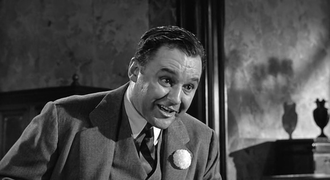Blast from the Past: Rod Steiger
Richard Wilson directed Al Capone, a biopic crime drama, written by Malvin Wald and Henry F. Greenberg and starring Rod Steiger in the titular role, offering a deglamorized portrayal of the notorious gangster.
The tale begins in Chicago, 1919, when a young Al Capone arrives to work for mob boss Johnny Torrio. He meets Torrio’s top man, “Big Jim” Colosimo, who runs business and politics in the First Ward while secretly on Torrio’s payroll.
Grade: B
Prohibition is enacted a year later, causing Torrio and others, like Dean O’Banion, George “Bugs” Moran and Earl “Hymie” Weiss, to compete for profits in bootleg liquor and beer.
As Colosimo is too old to get the new liquor racket, Capone convinces Torrio to allow Colosimo’s assassination, making Torrio kingpin.
A reform mayor is elected, causing Torrio and Capone to change their operation base to Cicero. Capone has O’Banion killed and makes a play for Maureen Flannery, the widow of one of Colosimo’s men.
Weiss and Moran order Torrio to be shot, and the wounded Torrio retires to Italy, turning the full rackets over to Capone. Capone retaliates by killing Weiss, forcing merchants throughout the city to pay for “protection.”
Sergeant Schaefer in the Chicago police is promoted to captain, vowing to end the bloodshed and extortion and put Capone behind bars.
With the heat on from the cops, crooked newspaperman named Keely tries to bribe Schaefer but fails. He persuades Capone to move to Florida until things cool down. From distance, Capone masterminds the St. Valentine’s Day Massacre, with several of Moran’s men gunned down in a Chicago garage.
Maureen, fed up by Capone’s corruption and violence, informs the Feds, who find a way to finally put Capone away—on charges of tax evasion–leading to eleven years at Alcatraz.
The final scene has Capone brutally beaten by Alcatraz inmates, delighted to catch him without bodyguards.
The production ban on gangster films was lifted in the late 1950s, leading to the making of such pictures as Baby Face Nelson (1957).
J. Edgar Hoover criticized the film and a proposed film about Pretty Boy Floyd was dropped. However, in 1957 Lindsley Parsons and John Burrows decided to produce a film about Al Capone for Allied Artists. Jack DeWitt was assigned to write the script, Malvin Wald and Henry Greenberg, known for their true-life screenplays, also contributed.
Steiger refused the part several times, holding that the script inappropriately romanticized Capone and criminality. Steiger agreed to play the role contingent on rewrites of the script, turning it from just another sensational crime drama into what he described as “a good social document, showing how unscrupulous man preys on society.”
Deemed a tough, ruthless and unsentimental account, Al Capone became the highest-grossing film at the U.S. box-office in May 1959, and third-highest overall behind Billy Wilder’s drag comedy Some Like It Hot (which, ironically, was set in 1929) and the Lana Turner-Sandra Dee starring melodrama, Imitation of Life.
The film earned in U.S. rentals over $3 million, and its box-office success led Allied Artists to produce other gangster films, including The Big Bankroll and The George Raft Story.
Curio Items
Al Capone’s sister sued the filmmakers for $10 million for failing to secure permission, citing invasion of privacy, but a judge ruled in the filmmakers’ favor. Capone’s sister, widow and son later sued Desilu and the other producers of The Untouchables for $6 million but lost that suit as well.
Cast
Rod Steiger as Al Capone
Nehemiah Persoff as Johnny Torrio
Fay Spain as Maureen Flannery
Joe De Santis as Big Jim Colosimo
Martin Balsam as Mac Keely (based on Jake Lingle)
James Gregory as Schaefer
Murvyn Vye as Bugs Moran
Sandy Kenyon as Bones Corelli
Clegg Hoyt as Lefty (uncredited)
Jack Orrison as Police Clerk
Robert Gist as Dean O’Banion













